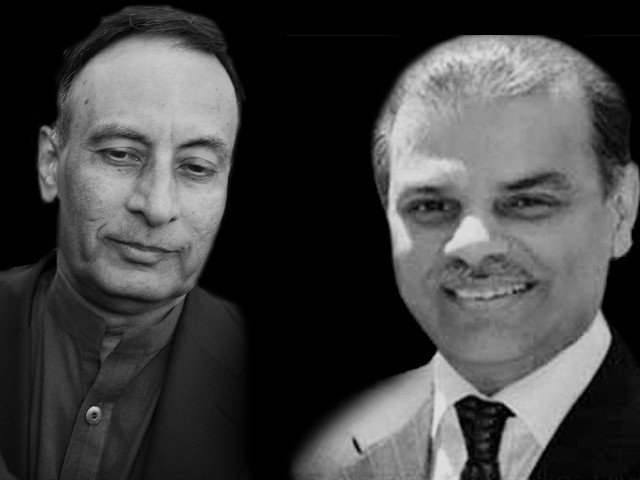Seeking equal treatment: Haqqani challenges memo commission’s summon
Seeks to record statement from abroad via video link.

Former envoy to United States Husain Haqqani attempted to seek equal treatment, and permission to appear via video-link, as was done in the case of Mansoor Ijaz, the central character in the Memogate scandal.
Haqqani filed a petition in the Supreme Court on Saturday, challenging the Memogate commission’s order for him to appear in person in Islamabad.
The petition – filed by his counsel Asma Jahangir – states that Haqqani has grave security concerns because of “many frivolous and sensational allegations levelled by Ijaz during his witness recordings”.
Details of the threats received by Haqqani would be revealed at an appropriate stage of the proceedings of the case, said Haqqani’s counsel Zahid Bukhari while speaking to The Express Tribune.
“At this time, we only want to ask the Supreme Court to review its previous order,” he said.
The commission, in its March 18 order, had said that Haqqani’s evidence would only be recorded after he submits admission or denial of documents presented by other respondents.
The request to have Haqqani’s evidence recorded immediately was misplaced, the petition states.
The commission also cited Haqqani’s undertaking before the Supreme Court that he would return to Pakistan and appear before the commission on a four-day notice.
Haqqani’s petition challenges the commission’s position that it is bound by the Supreme Court’s order of January 30.
The commission is not prohibited in any way through that order to insist on physical presence of Haqqani, especially as facilities to record his statement via video link are available and were extended to a foreigner, the petition states.
“The petitioner is also a family man, like Mansoor Ijaz, who pleaded that his family was fearful for his life in case he traveled to Pakistan,” the petition said, adding that the “same standard of concern by the commission may also be extended to [Haqqani].”
Haqqani’s statement
In a written statement submitted before the commission on Saturday, Haqqani said he was not ‘shown any evidence’, as claimed by former spymaster Lt Gen Ahmed Shuja Pasha in his affidavit before the Supreme Court.
In his affidavit, Pasha said he had seen ‘enough corroborative material’ to prove Ijaz’s version of the events.
Denying any role in the memo scandal, however, Haqqani said he was not shown any such material during the meeting at the Prime Minister House on November 22, 2011 — attended by the president, the prime minister and the army and intelligence chiefs — wherein he offered to resign as ambassador.
“I had no role in creating, drafting and/or delivering the memorandum to former Chairman of the US Joint Chiefs of Staff Admiral Michael Mullen,” Haqqani stated in his 80-page statement.
“There has been no ambiguity in my consistent stance in this respect,” he added.
He also said that he had “full access within the US government” to communicate any messages on behalf of the government, and did not need an intermediary ‘of controversial credentials’.
The statement said that Haqqani had submitted his complete telephone bills, and claimed that most calls between him and Ijaz were initiated by the latter.
Haqqani also denied that a meeting took place between Ijaz and President Zardari on May 5, 2009.
“I submit the official programme of the president’s visit, maintained by the embassy of Pakistan, which shows that no such meeting took place.”
Yasin Malik arrives in Islamabad
Jammu and Kashmir Liberation Front (JKLF) Chairman Yasin Malik arrived in Islamabad late Saturday night to appear before the memo commission.
Malik had requested the Supreme Court to allow him to become a party before the commission, after Ijaz alleged that he had arranged a meeting between Malik and then-chief of Indian intelligence agency RAW.
Talking to the media outside the airport, Malik said he would appear before the commission on Monday, March 26. “I will apprise the commission of the allegations Ijaz has leveled against me,” he added.
Earlier, during cross-examination before the commission, Ijaz had claimed that Malik, at the insistence of the US government, had met then-RAW chief.
Published in The Express Tribune, March 25th, 2012.



















COMMENTS
Comments are moderated and generally will be posted if they are on-topic and not abusive.
For more information, please see our Comments FAQ